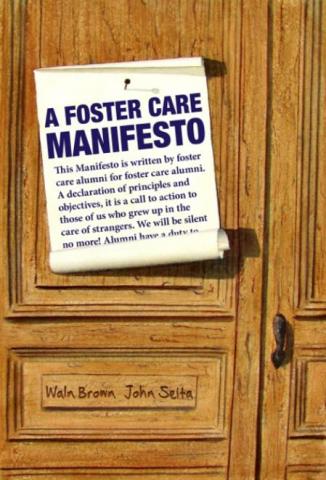
This manifesto is written by foster care alumni for foster care alumni. A declaration of principles and objectives, it is a call to action to those of us who grew up in the care of strangers. We will be silent no more! Alumni have a duty to make sure that every young person in out-of-home care enjoys a safe, stable and nurturing placement as well as a successful transition to independent living. That is our mission, the purpose of this manifesto.
Government is a neglectful substitute parent, harming too many brothers and sisters and limiting too many more to lesser lives. This has to change ... now. Alumni must initiate and oversee the reformation of this well-documented failure of a child welfare system. Who else knows how to fix it? Even the most educated, caring, capable and seasoned child welfare professionals can never fully understand ¬what is in “the best interests of the child” if they have not lived in placement. Nor do they possess the moral authority to determine a child’s fate based on theory, guesswork or good intentions. This lack of personal experience restricts the understanding of even the best and brightest non-alumni child welfare professionals which, in turn, limits the dependent boys and girls they serve.
Conversely, nobody cares as much as alumni do about fixing foster care. Only alumni know what placement experiences hurt or helped us … why … and how to eliminate the bad and emphasize the good. That is the special knowledge alumni possess; it is the reason why former foster kids must guide foster care programs, policies, practices and the allocation of resources. That is how we can use our painfully gained experiences to transform the child welfare system into a safer and healthier place in which to grow up.
Although this manifesto is something of a political statement, too, it is more so a road map of how to get from mission statement to mission accomplished. The rationale, strategy and array of important roles alumni must play are detailed herein. There is a lot to do, requiring the best efforts of former foster kids committed to providing their support, wisdom and expertise in any way they can. Indeed, the shaping of this manifesto sets an example as to why this movement requires a collective effort.
Nine alumni contributed to this manifesto, blending our personal experiences and professional expertise into a single vision. We are women and men, black and white, young and old. Our placement experiences include orphanages, children’s homes, group homes, foster and adoptive families, kinship care, detention centers, juvenile reformatories and mental health facilities. We are mostly college educated and work with or on behalf of children in care. Improving the foster care experience is a mission each of us had undertaken on our own but now shares as a common goal by contributing to this manifesto.
There is power in numbers – and clarity of purpose as well. No one of us acting alone can fix foster care, but all of us working as one possess the knowledge and resolve required to safeguard the future for the legion of foster kids following our footsteps. The message embedded in this manifesto must become the unbroken legacy handed down from one generation of alumni to the next generation of those of us who made a personal vow to someday … in some small way … make foster care a more positive experience than it was for us. Now is the time to make good that promise, and this manifesto provides our perspective of how to do it.
Do you remember the day you became a ward of the court? Were you worried; scared; lost? Did you feel light- headed; weak; sick to your stomach? Could you feel your heart pounding your chest? Did your mind spin wildly in an endless loop of questions in search of answers, answers that riddled your mind with frightening questions, such as: What’s happening to me? Where are my brothers and sisters? What’s wrong with my parents? Why does my life suck? Does anybody love me? Why can’t I just die?
Did you have emotional or psychological problems in placement? Did you receive mental health services? Did anyone understand or help you? How do you rate your mental health on leaving foster care?

 Owner/Editor - Chris Chmielewski
Owner/Editor - Chris Chmielewski